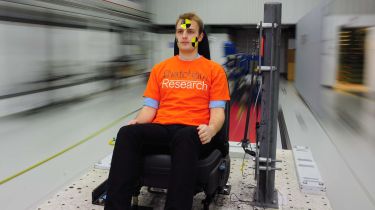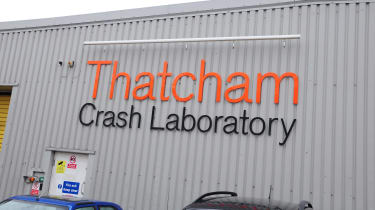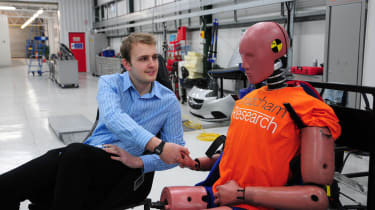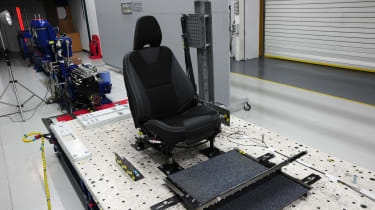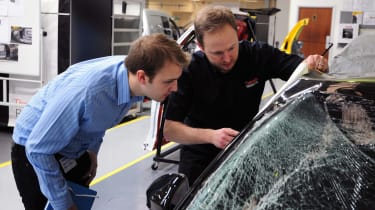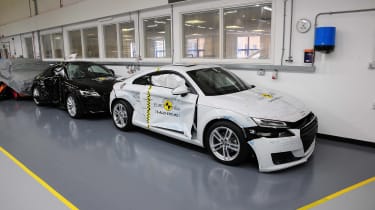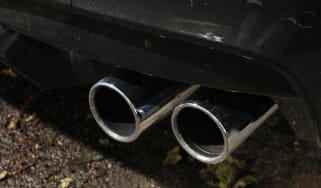What is Thatcham? Thatcham approved devices and crash tests explained
Thatcham studies crashes, rates alarms and sets insurance groups to help cut drivers’ costs. We find out how
When researching car security systems, you may have seen the phrase ‘Thatcham approved’ make an appearance, but what does a town in Berkshire have to do with vehicle safety and security? Towards the end of the 1960s, a group of British car insurers joined forces and founded the Motor Insurance Repair Research Centre in the small Berkshire town. However, MIRRC wasn’t a particularly catchy acronym, so it eventually became known simply as ‘Thatcham’.
Flash forward to the late 80’s, and the insurance industry was growing tired of replacing stolen Audi Quattros and Sierra Cosworths, so worked with the government to establish standardised methods of protecting cars from theft. Eventually, Thatcham (the organisation not the town) was approached and tasked with outlining a set of guidelines for car manufacturers, which had the sole purpose of improving the effectiveness and reliability of car security devices. From this, the various different category Thatcham alarms were born.
Since then, the company has continued to grow and to this day remains supported by 30+ insurance companies. Its primary task is to keep the cost of insurance down by benchmarking the industry standards for security systems, however its remit has grown to include other areas of motoring such as crash testing and, more recently, driver assistance systems.
Thatcham approved car security
Alarms that carry the Thatcham name are not designed and manufactured by the Berks company, but they are subjected to their rigorous testing and if passed are awarded a ‘Thatcham Quality Assurance’ mark and included in one of their seven categories.
The numbering system for the Thatcham approved categories is done to outline the system type, rather than a product's effectiveness, and can be found summarised below:
- Category 1 is an electronic alarm and immobiliser. The alarm must have perimeter detection, ignition detection, passenger compartment detection and audible warning with its own power supply. The immobiliser on the other hand must be passively set (i.e. you don't have to turn it on and off like in some older cars) and must isolate at least two of the car’s operating circuits.
- Category 2 is only an electronic immobiliser, which must also adhere to the same two criteria as category 1.
- Category 2-1 is when a cat 2 car is upgraded to cat 1 after leaving the factory without an alarm. The retro fitted alarm must meet the same rules described above in cat 1.
- Category 3 is where your good old-fashioned steering wheel clamp comes in. These systems are mechanical immobilisers and must be easy to set and unset, isolate at least one system i.e. your steering, and be permanently or temporarily installed.
- Category 4 is wheel locking devices, which mainly save you the embarrassment of arriving back to find your car propped up on bricks. To meet Thatcham’s standards they must be reliable and durable, resistant to attack and finally have a secure key replacement procedure.
- Category 5 is the top of the line 21st century solution for tracking your vehicle. They allow remote immobilisation, instigate a police response (which may require subscription), notify a pre-agreed security firm, and include driver identification, motion sensors, street mapping, and position data, which of course uses both GPS and GSM for good measure.
- Category 6 is a step down from 5. Still offering a healthy dollop of tracking powers, it does without the remote immobilisation and police response, and driver identification is not always included.
- Category 7 is even further down the technological food chain, offering the most basic form of tracking. However these systems can still be very effective.
The main purpose for installing a Thatcham approved alarm is the reduction in insurance cost. However, the cost of buying and fitting the alarm will be significantly more than the reduction to your premium for the everyday driver (top of the line cat 5 alarms can set you back nearly £1000), however the piece of mind is often reason enough for people to pay more to protect their wheels.
Thatcham crash testing
Another major string to the Thatcham bow is crashing cars for a living. That’s the job of the experts at Thatcham Research, who pour hours upon hours into making sure our cars are as safe as they can possibly be.
The research facility at Thatcham houses one of only seven Euro NCAP-approved crash test facilities in the world, and Auto Express paid it a visit to get a sneak peek and find out how Thatcham Research is helping the industry.
First up is the crash lab itself. Up to six cars are tested each year for Euro NCAP, with four examples of each model offered up to be sacrificed. The three tests taking place here are a 40 per cent offset front crash at 64kph (39mph), a 50kph (31mph) side crash into a moving barrier and a 29kph (18mph) impact into a static pole.
It can take as much as a week to prepare a car for testing and several days to analyse the data before Euro NCAP is happy with the final star rating. Preparations even include going to the trouble of polishing a car before crashing it, because it has to look as good as it can in the official images.
Test dummies are also constantly being updated in the pursuit of the most realistic and accurate representation of a human being, and this doesn’t come cheap.
The Hybrid III dummy – originally developed to represent the 50th percentile male at five foot nine inches and weighing 80kg – costs £100,000. It’s designed to research the effects of frontal impacts, and the range has now expanded to feature a woman, two children and a larger man.
While the Hybrid III is pricey, it pales into insignificance next to the new WorldSID dummy, which will set you back £300,000. It’s been developed to measure rib, spine, and internal organ damage in side collisions, plus spine and rib deceleration and compression of the chest cavity.
With a dummy costing more than a supercar, you’d think it was the most expensive item in the Thatcham crash lab. You’d be wrong. Whiplash testing is also carried out here on car seats, and for this you need a Hyper G sled. There are only two in the world and they cost £1million each.
It can be accelerated to 10mph in just a tenth of a second, thus recreating the forces endured by a driver or passenger in a typical low-speed shunt. It’s extreme stuff, but totally necessary to ensure we’re as safe as we can be in our cars and help reduce the amount of whiplash claims – one of the biggest outlays to insurers.
These insurers are the ones who fund the non-profit Thatcham Research, as the work done by the organisation goes some way to cutting claim costs and ultimately allows insurers to offer drivers cheaper policies.
Thatcham crash repair technology
While crash testing for safety is important, putting cars back together is also high on the priority list in Berkshire. Thatcham’s Repair Technology Centre houses an independent bodyshop that develops the best methods and practices to repair cars. It provides instructions for the cheapest and safest processes on the best-selling UK models and will advise a manufacturer if it thinks that they’ve got a repair method wrong. Such is the significance of Thatcham’s work that its repair methods are now being rolled out in Australia.
The complexity of any repair and how well a car performs in a crash lab all feeds into how much drivers pay for their insurance policies via group ratings. Thatcham assesses every car and gives it a rating between one and 50 to advise insurers on what they should be charging drivers. Getting a better rating means a car is cheaper to repair, safer in a crash and, in this day and age, has more advanced safety tech fitted.
Manufacturers’ safety kit is a growing area for Thatcham, and technicians spend hours analysing data to see which systems have the biggest impact on safety. If there’s something that has a real-world benefit in cutting claims or reducing accidents, such as autonomous emergency braking, Thatcham will incentivise it by offering a lower insurance group to cars fitted with it.
Thatcham assisted driving grading
As assisted driving systems like Adaptive Cruise Control, Lane Keep Assist, and forward collision warning become more commonplace in our cars, Thatcham has worked with Euro NCAP to launch the world’s first dedicated grading system for assessing them. There are three key areas that are focussed on when these systems are tested:
- Vehicle Assistance - what a car does to support the motorist while driving.
- Safety Backup - what a car does to protect its occupants in the event of an emergency.
- Driver Engagement - how a car monitors driver engagement, how it communicates the assistance status, and how easy it is for the driver to engage with the assisted system.
Not only do these tests exist to ensure the safety of assistance systems for drivers, but they are also conducted with Thatcham’s aim to ‘demystify the technology, encouraging widespread adoption and safe use’ in mind.
Each system is tested and then scored out of 100 for each of the three criteria. However, the maximum number of points available is 200 rather than 300, as the lower score from Vehicle Assistance and Driver Engagement is added to the score of the Safety Backup, to arrive at the overall score for the system. A score of 160 points and above is ‘very good’, 140 and above earns a ‘good’ result, 120 points or more is a ‘moderate’ result, and anything less is given an ‘entry’ grading.
Thatcham works between the manufacturer, insurers and consumers to get the best deal for everyone while ensuring drivers are safe and not being ripped off. It’s an unsung role to play, but one that’s necessary.
What are your top car security tips? Let us know in the comments...
Find a car with the experts
